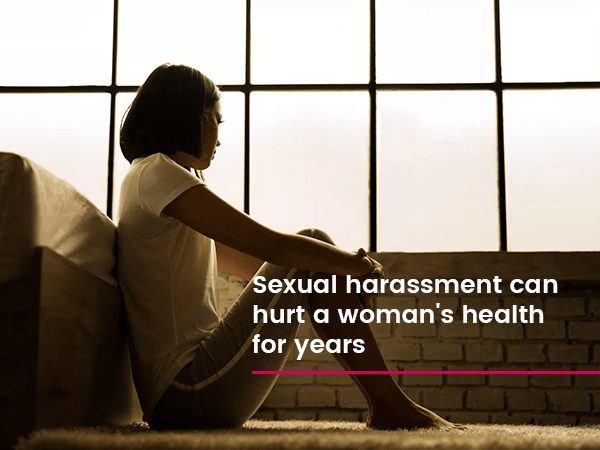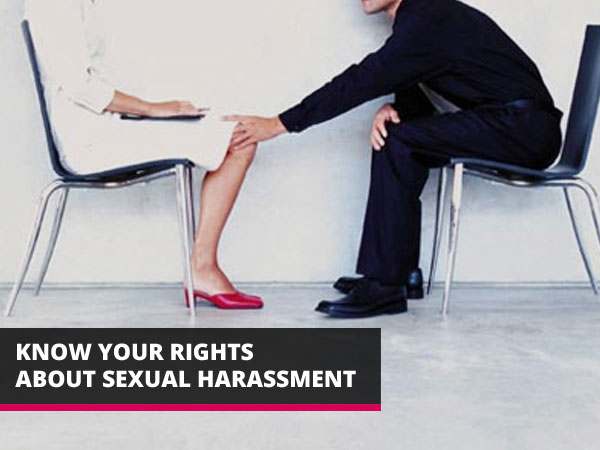
Women who had a history of sexual trauma were three times more likely to have depression and twice as likely to have anxiety compared to women who had never experienced sexual assault. The #MeToo movement has made it clear that behaviors like unwanted sexual contact, coercion, lewd comments, and unprompted advances are common—in the workplace, in social situations, and even within trusted institutions like schools, sports teams, and churches. Here are some of the major ways assault and harassment can take a toll on survivors’ health and well-being, and what they (and their loved ones) can do to heal.
- Depression and anxiety
Anyone who’s ever experienced unwanted sexual advances or commentary knows that those words or actions can really stick with them—and if they happen repeatedly, they can have long-term effects on a person’s mood and mental health. Any underlying depression or anxiety can also get worse, and in the worst-case scenario it can result in injury to self.
- Poor self-esteem and body image
Sexual harassment can also lower people’s self-esteem and body image—even if the comments or behaviors they’re exposed to are complimentary on the surface. Sexual harassers like to exert power over the victim, whether it’s a boss, a mentor, or someone with more money or higher stature.
Unwanted sexual attention can also make existing body-image and self-esteem issues worse. When harassment is subtle or non-concrete, other people might not take it seriously, and it can make the victim question whether it’s really happening.
- Avoidance of places or activities
Harassment can take the pleasure out of experiences survivors would otherwise enjoy and can cause them to withdraw from activities or stop going places they once loved. For example, in a study of nearly 300 women who played online video games, women were more bothered—and were more likely to stop playing—when they experienced sexual harassment, versus general “trash talking” of a non-sexual manner.
- Disordered eating or loss of appetite
Problems with body image and self-esteem are often accompanied by disordered eating, and these can all be consequences of chronic sexual harassment. In addition, high levels of stress can lead to loss of appetite, which could then lead to weight loss, nutritional deficiencies, and related health risks.
- Out-of-control stress hormones
The brain perceives sexual harassment as a threat, which triggers the body’s flight-or-fight response. When this happens, levels of the stress hormone cortisol skyrocket, which can leave a person feeling anxious, on edge, and defensive. This can happen anytime a person perceives chronic stress or harassment, or feels unsafe for any reason. Elevated cortisol levels can be protective in the short-term, but when stress becomes chronic, it can begin to affect a person’s physical health: Inflammation levels rise throughout the body, which can lower immunity and raise the risk for serious conditions like heart disease and cancer.
- Homelessness
The mental and physical effects of sexual assault and harassment can have long-reaching consequences on a person’s ability to form relationships, hold a job, and function in society—as evidenced by a 2016 study of men and women in the military. A research has shown that the connection between homelessness and sexual harassment extends to people outside of the military as well—especially to women. Landlords may expect sexual favors in return for housing or making repairs, and tenants who refuse may face further harassment or even eviction. Many women in homeless shelters also end up there because of harassment or abuse from husbands, boyfriends, or other men in their life.
- Career problems
Harassment on the job not only makes going to work uncomfortable; it can also hamper a person’s opportunities for advancement and their motivation to excel, which can have professional and financial consequences down the road. Studies—and recent news headlines—have shown this is a common problem, especially in male-dominated fields like scientific research, medicine, and technology. Organizations need to be proactive in establishing policies prohibiting sexual harassment, raising employee awareness, establishing reporting procedures, and educating employees about these policies.
- Sleep disturbances
It’s very common for people who experience sexual harassment to experience insomnia. They play it over and over in their head, or it keeps coming back to them when they try to lie down at night. When they do fall asleep, she says, traumatic experiences can cause nightmares. This may be one way sexual harassment contributes to other physical health problems. When you can’t sleep because of something so stressful, it can really wreak havoc on your body and put you at higher risk for all kinds of long-term problems.
- PTSD (Post Trauma Stress Disorder)
Someone with a history of unwanted sexual experiences can suffer from post-traumatic stress disorder or PTSD—a condition that can include anxiety, panic attacks, crying spells, flashbacks, and visceral physical reactions, like headaches, stomach problems, and teeth grinding. Their stress response is working overdrive, so they might overreact to something that wouldn’t be threatening to someone without the same history.
How survivors can heal?
If you or a loved one has experienced sexual harassment and is suffering from these or other health issues as a result, the first step toward healing is talking about it with someone you trust. Getting it out, verbalizing it outside of your body and your brain, can help tremendously. If you’re not comfortable talking to a counselor or a doctor, start with a supportive friend or family member. Eventually, talking with a mental health professional can help you develop tools and coping mechanisms for overcoming your trauma, escaping an unhealthy situation, and identifying any triggers that are affecting you on a regular basis.






,